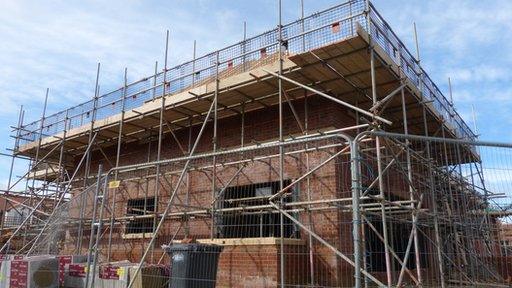Housebuilders benefit from Help to Buy extension
- Published

The government says 120,000 more homes will be built through Help to Buy
Shares in Britain's housebuilders have risen sharply, following the chancellor's decision to extend the Help to Buy scheme for new homes.
Persimmon was the FTSE 100's top riser, up more than 6% at one stage.
The rises came after George Osborne announced that the first part of Help to Buy - the equity loan scheme - will be extended for an extra four years.
However, critics say the extension will only make house prices more unaffordable.
Instead of ending in 2016, the first part of Help to Buy will now end in 2020, in England at least.
No announcement has yet been made about the separate schemes in Scotland and Wales.
The second part of Help to Buy - the UK-wide mortgage guarantee scheme - is still due to finish at the end of December 2016.
As well as Persimmon's share price rising, shares in Bovis Homes climbed 4.4% and Taylor Wimpey shares rose 3.4%.
Self-defeating?
The chancellor announced that an extra £6bn would be put into the English scheme, allowing a further 120,000 new homes to be built.
But while the news has been welcomed by the Home Builders Federation (HBF), some critics have warned it will put further pressure on house prices.
Andrew Sentance, an adviser to accountancy firm PwC and a former member of the Bank of England's Monetary Policy Committee (MPC), said prices could get out of control.
"We're on the threshold - if some of this support for the housing market is not reined in - of a housing bubble," he told the BBC.
And he warned that the purpose of the scheme, to help first-time buyers, could prove self-defeating.
"The combined impact of low interest rates and these schemes is pushing up house prices, and taking them out of the reach of first-time buyers," he said.
Subsidies
Under the equity loan scheme, buyers can put down a deposit of just 5% on a new home, and take out a mortgage of up to 75% of its value.
The difference is made up with an equity loan of up to 20% from the government.
In other words the government takes a stake in the value of the home.
When it is eventually sold, the government will make a profit, or a loss, depending on what has happened to the property's value.
Questions have been raised about whether the scheme is the best way to encourage house building.
Earlier this month, the National Audit Office said it could not yet say whether the scheme would provide value for money for tax-payers.
And while many economists have welcomed the boost to the housing market, others remain sceptical.
"The government could have used that money in other ways," said Matthew Pointon of Capital Economics.
"They could have built houses directly, or used local authorities. But this way subsidises housebuilders and their shareholders," he told the BBC.